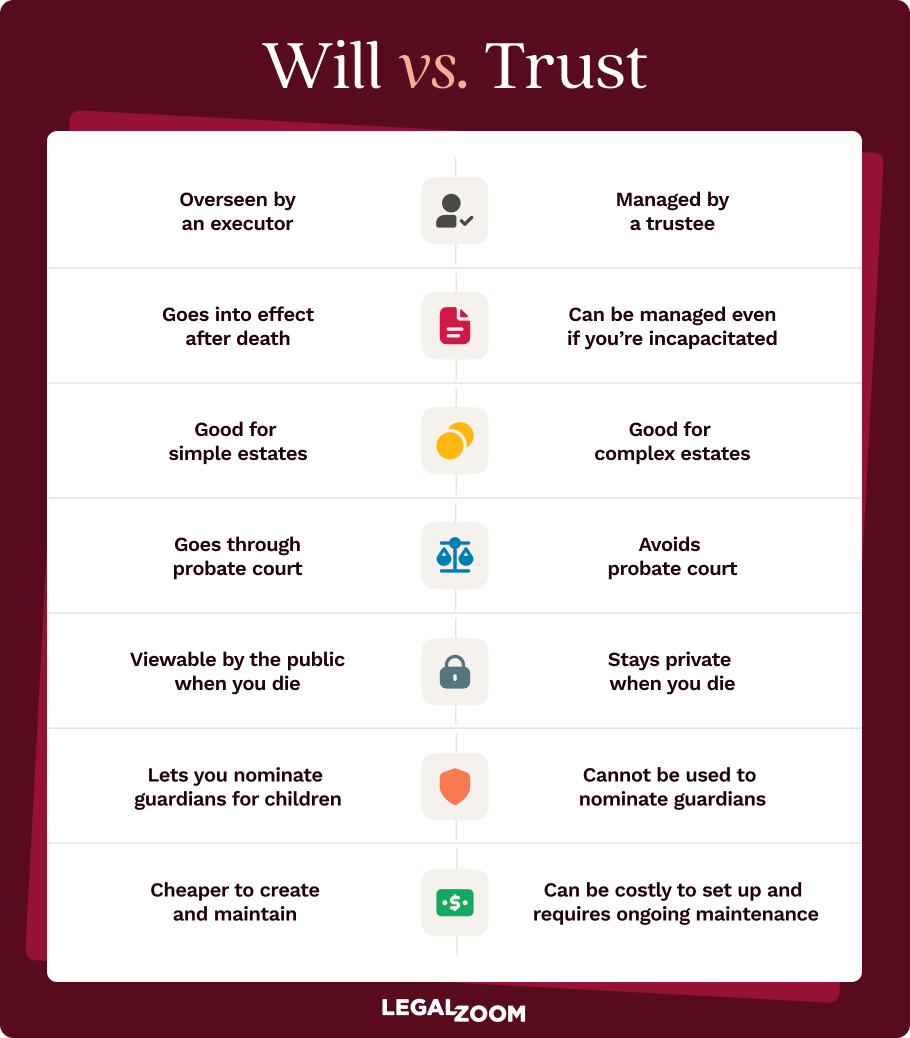In 2025, more than half of American adults still don't have a will. This staggering statistic means that millions of families could face unnecessary complications, potential family disputes, and longer probate processes when a loved one dies. The good news is that creating a will is far simpler than most people imagine, and the peace of mind it provides is invaluable for both you and your family.

Key takeaways
- A will helps ensure that your assets go to the beneficiaries you choose.
- A valid will must meet specific legal requirements that can vary by state. Rules typically include two witnesses and, in some states, notarization.
- You can update or revoke your will at any time.
- Without a will, state law dictates who manages your estate, receives your assets, and cares for your minor children or pets.
What is a will and why is it important?
A last will is a legal document that outlines how to distribute your assets after your death and who you want to be responsible for carrying out your wishes. When you die without a will (called “dying intestate”), state laws determine who receives your property. However, these laws don’t always account for the complex structures of many modern families.
What should you include in your last will?
A last will and testament needs to contain specific elements that meet state requirements and accurately reflect your wishes.
Commonly required elements
- Your information. Clearly identify you as the testator (creator of the will). It should include your full legal name, address, and any aliases you've used to prevent confusion about your identity and ensure the document is legally binding.
- A statement that you're mentally competent. State that you're of sound mind and making the will voluntarily for your own benefit.
- List of beneficiaries. Clearly specify who should receive each item or what percentage of your estate each beneficiary should inherit.
- Executor. Name a primary executor to manage your estate and at least one alternate in case your first choice can't serve. Include their full names and contact information.
- Signature and date. Sign and date your will in the presence of witnesses based on your state's specific requirements.
Recommended elements
While not necessarily required, the following items can be addressed in a will and allow you to clearly voice your wishes.
- Legal guardian for minor children. If you have children under 18, appointing guardians is one of the most critical decisions you'll make in your will. Consider both personal guardians (who will raise your children) and financial guardians (who will manage any assets left to your children).
- Testamentary trusts. A testamentary trust is part of your will and takes effect after your death. Its main goal is to provide support to anyone who might benefit from professional asset management rather than a direct lump sum inheritance.
- Specific bequests. Specific bequests are individual gifts (items or money) that you give to named beneficiaries. These might include family heirlooms, artwork, vehicles, or cash gifts to friends or charities.
We can help cover the essentials, plus healthcare and financial documents that go beyond naming beneficiaries.

How to create a will in 5 steps
You can create a will on your own, follow an online template, or work with an attorney or will service. Whichever method you choose, you can expect the process to follow 5 basic steps.
Step 1: Take inventory of your assets and debts
First, create a complete list of everything you own and owe. Common assets addressed in wills include:
- Real estate
- Bank accounts
- Investment accounts
- Retirement accounts
- Life insurance policies
- Vehicles
- Jewelry
- Artwork
- Personal belongings with significant value
- Digital assets like online accounts and digital media collections
Document any debts as well, such as the following:
- Mortgages
- Credit card balances
- Student loans
- Money you've borrowed from family or friends
It may seem tedious, but a thorough inventory helps you understand the full scope of your estate and helps your executor after you pass away.
Step 2: Choose your beneficiaries and executor(s)
Decide who should receive your assets. It's wise to consider both primary beneficiaries and contingent beneficiaries in the event that your primary beneficiary either refuses the inheritance or predeceases you. Beneficiaries are often family members, but could also be partners, friends, charities, or organizations.
You must also select an executor who is trustworthy, organized, and capable of handling complex financial and legal responsibilities. This person will need to locate and secure your assets, pay debts and taxes, and distribute your estate according to your will's instructions. Consider naming a co-executor to act with you or a backup executor in case your primary choice can't fulfill the duty.
Step 3: Name guardians for any minor children
If you have children under 18, carefully consider who could best care for them in your stead. Think about potential guardians' parenting styles, values, financial stability, and their ability to help your child navigate the disruption of your death.
You may also want to name a financial guardian, or "conservator" in some states, to manage any assets your children inherit until they reach adulthood. This could be the same person as their guardian, but could also be different.

Step 4: Draft your will
You can draft your will yourself, use a reputable online will service like LegalZoom, or work with an estate planning lawyer. Regardless of which approach you choose, make sure your will is comprehensive and follows your state's specific legal requirements.
Use clear, unambiguous language and avoid vague terms that could lead to disputes among your beneficiaries. Even if you do a DIY will, you should still consider having an attorney review the completed document. LegalZoom’s network of attorneys can help.
Step 5: Sign and witness your will according to state laws
Most states require two witnesses who are not beneficiaries to watch you sign the document, and then sign it themselves. Some states also require notarization. Make sure to check your state's specific requirements, as improper execution can invalidate your will.
Generally, this should take place in a single session with all parties present. Your witnesses should also be adults who can later testify about your mental capacity and motivations if necessary. Keep a detailed record of when and where you signed your will.
Legal considerations and common pitfalls
You must follow your state's specific legal requirements to create a will that courts will recognize and enforce.
- Age and mental capacity requirements. In all states, you must be at least 18 years old to create a valid will, though some states allow younger individuals to make wills if they're married or serving in the military.
- Testamentary capacity. This means you understand the nature and extent of your property, know who your natural beneficiaries are, and comprehend the legal effect of creating a will.
- Witness requirements. Most states require two witnesses who aren't beneficiaries to see you sign your will and then sign the document themselves in your presence. Some states ask for additional requirements such as notarization.
- Holographic wills. There are states that recognize holographic wills (handwritten wills), but requirements vary significantly. While they may be valid in your state, they're more likely to face challenges without witnesses to testify about your mental state and motivation.
Common mistakes to avoid when creating a will
Here are some common pitfalls to avoid problems that could complicate the process.
- Failing to properly execute the will. Not following your state's witnessing, signing, or notarization requirements can invalidate your entire will.
- Using vague or ambiguous language. Unclear instructions can lead to disputes and costly legal proceedings to interpret your intentions.
- Forgetting to name contingent beneficiaries. If your primary beneficiaries predecease (die before) you, your assets might not go where you intended.
- Forgetting to update beneficiary designations on accounts. Retirement, life insurance, and other accounts with beneficiary designations pass outside your will and should be coordinated with your estate plan.
- Overlooking digital assets. Online accounts and digital media may need specific provisions for access and transfer.
- Failing to consider tax implications. Large estates might face federal or state estate taxes that proper planning could minimize.
- Not discussing your plans with family. Surprising your family with unexpected will provisions can lead to hurt feelings and legal challenges.
- Storing your will in an inaccessible location. Your executor needs to be able to locate and access your will promptly after your death. There are important deadlines that loved ones could miss if the executor can't locate your will.
- Attempting complex estate planning without professional help. Complicated family situations, large estates, or tax concerns often require attorney guidance.
- Not considering other estate planning documents. Your estate plan should also include documents that account for incapacity, such as powers of attorney and advance directives.

Beneficiary considerations
These decisions significantly impact how smoothly your estate administration goes and whether your final wishes come to fruition.
- Understanding beneficiary designations. Beneficiaries can include individuals, organizations, or charities. Be specific to avoid confusion. Instead of "my children," list each child's name. If you want to include future children or grandchildren, use language like "my children, including any born or adopted after the date of this will."
- Spousal rights and considerations. Most states provide certain protections for surviving spouses, even if they're not mentioned in a will or are left minimal assets. If you're married and want to leave most of your assets to someone other than your spouse, consult with an estate planning attorney.
- Providing for minor children. Minor children can't directly inherit significant assets, so you'll need to establish mechanisms for managing their inheritance until they reach adulthood. This might involve testamentary trusts, property guardians, or using custodial accounts under the Uniform Transfers to Minors Act.
- Providing for pets. While pets can't legally inherit assets, you can leave money to a trusted person with instructions to care for your pets. Some states also recognize pet trusts, which provide more formal legal protection for your animals' ongoing care and support.
How to update or revoke your will
Life circumstances change, and your will should reflect these changes to remain effective and relevant.
When to update your will
Review your will whenever you experience major life changes, including the following:
- Marriage
- Divorce
- Birth or adoption
- Death of beneficiaries or executors
- Significant changes in your financial situation
- Relocation to a different state.
You should also review your will every couple of years to ensure it still reflects your current wishes and circumstances. For example, if you've named guardians for minor children, consider whether your choices still make sense as your children grow and your potential guardians' circumstances change.
How to amend (change) your will
- For minor changes. A codicil is a legal document that amends specific parts of your existing will so you don't have to replace the entire document. Codicils work well for minor changes like updating name changes, modifying specific bequests, or adding a new beneficiary.
- For major changes. It's best to create a new will for major or multiple changes. This helps to avoid confusion and potential conflicts between your original will and multiple codicils. A new will should explicitly revoke all previous wills and codicils to prevent legal complications.

How to revoke (cancel) your will
There are two main methods:
- Create a new will that clearly states you revoke all previous wills and physically destroy the original will.
- Create a separate revocation document. This is a written document that states your intention to revoke your will. It typically has the same signature and witness requirements as your will.
A new will that doesn't contain a clause that properly invalidates the previously will(s) can potentially create conflicts. This clause is called a revocation clause and it may require specific language based on your jurisdiction.
If you physically destroy your will, make sure you also destroy all copies and inform your executor and other relevant parties that you've revoked your will and created a new one. Keep documentation of your revocation to prevent confusion or disputes later.
Pros and cons of creating a will
The benefits of creating a will far outweigh the potential drawbacks, but understanding both sides will help you make informed decisions about your estate planning strategy.
Benefits of having a will
A valid last will and testament allows you to do the following things:
- Decide who receives your assets. This control is especially important if you're unmarried but have a long-term partner, going through a divorce, or want to leave assets to friends, charities, or causes you care about.
- Select a guardian for minor children. A will allows you to name guardians for your children. While courts can go against your choice, judges typically give substantial weight to your written preference in custody decisions.
- Appoint an executor. You choose who manages your estate, pays your debts, and distributes your assets. This person should be someone you trust who has the time and ability to handle these important responsibilities.
- Dictate personal matters. Beyond financial assets, you can specify burial arrangements, pet care instructions, and other personal preferences that matter to you.
- Update as you go. Life changes, and your will can change with it. You can update your will through amendments called codicils or create an entirely new will whenever your circumstances shift.
Potential drawbacks, and reasons to consider a trust instead
- Probate requirements. Most wills must go through probate court, which can take months or even years to complete, is public, potentially expensive, and can delay assets from reaching your beneficiaries. Not having a will won't help you avoid probate, but other estate planning options might (including living trusts).
- Public record concerns. Once filed for probate, your will becomes public record, meaning anyone can access information about your assets and beneficiaries. Living trusts aren’t part of the public record since they avoid probate court.
- Limited tax planning. Basic wills may not address complex tax situations. This could potentially leave your estate or beneficiaries with higher tax burdens than necessary. You should consult with an estate planning attorney who can recommend strategies specific to your financial situation.

How LegalZoom can help with creating a will
You don't have to break the bank to create a will. LegalZoom offers comprehensive estate plan bundles, plus individual documents to fill in any gaps in your estate plan. From big ticket items like a last will to commonly-overlooked documents like a financial power of attorney, LegalZoom is here to help you make sure your wishes are honored.
Not sure where to start? Call us at (866) 679-1568 for a free discovery call.

Last will and testament FAQs
Do I need a lawyer to create a will?
While it's not a legal requirement, attorney assistance can help ensure your will is legally sound. This can be especially important in complex situations involving large estates, blended families, business ownership, or tax concerns.
Can I write my own will by hand?
Many U.S. states recognize holographic wills—that is, a will written entirely in your handwriting and signed by you. However, these wills are more likely to face legal challenges and must follow specific state legal requirements in order to be valid.
What happens if I die without a will?
If you die intestate (without a will), state laws determine how to distribute your assets, who manages your estate, and who cares for your minor children or pets.
How much does it cost to create a will?
The cost of writing a will varies widely depending on the method you use and the complexity of your situation. DIY options using online templates or online legal services typically range from $10 to $250, and attorney fees can range from $300 to $1,000 or more for complex estates.
Where should I store my will?
Keep your original will in a secure but accessible location like a fireproof safe, safety deposit box, or with your attorney. Inform your executor and close family members about the location. Avoid storing it in a safety deposit box that only you can access, as this can delay the distribution of your assets.
Can I disinherit family members?
In most states, you can disinherit adult children and other relatives, but you generally can't completely disinherit a spouse due to elective share laws that protect a surviving spouse from being completely disinherited by the deceased spouse's will. If you want to disinherit someone, it's best to consult an attorney who can talk you through your options.
How often should I update my will?
Review your will after major life events and every couple of years to ensure it still reflects your current situation and wishes. Regular reviews help you catch changes in your assets, relationships, or state laws that might affect your estate plan.
Michelle Kaminsky, Esq., contributed to this article.



